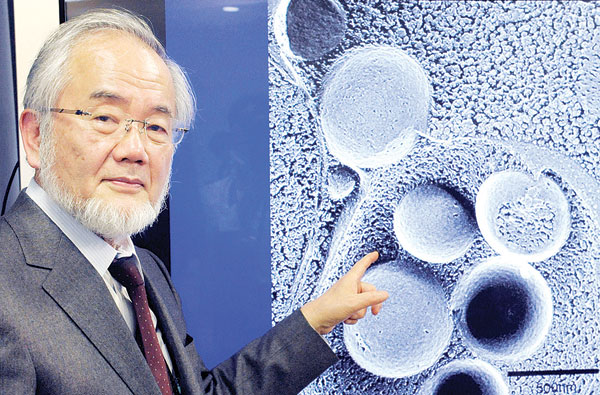Japanese scientist wins Nobel for cell 'self-eating' studies
Updated: 2016-10-04 01:32
(Agencies)
|
|||||||||
 |
|
Yoshinori Ohsumi, a professor at the Tokyo Institute of Technology, pictured in Tokyo last year. [Photo/Agencies] |
Japanese scientist Yoshinori Ohsumi was awarded this year's Nobel Prize in medicine on Monday for discoveries about how cells break down and recycle parts of themselves in an internal garbage disposal process.
The Karolinska Institute honored Ohsumi for "brilliant experiments" in the 1990s on autophagy, a phenomenon that means "self-eating" and describes how cells gobble up damaged content and provide building blocks for renewal.
Disrupted autophagy has been linked to several diseases, including Parkinson's, diabetes and cancer, the institute said.
"Intense research is now ongoing to develop drugs that can target autophagy in various diseases," the institute said in its citation.
Ohsumi, 71, from Fukuoka, Japan, is a professor at the Tokyo Institute of Technology. In 2012, he won the Kyoto Prize, Japan's highest private award for global achievement.
"As a scientist, I'm extremely honored," Ohsumi said, during a live telephone interview with Japanese broadcaster NHK.
Speaking about his work, he said the "human body is always repeating the auto-decomposition process, or cannibalism, and there is a fine balance between formation and decomposition. That's what life is about".
Nobel committee secretary Thomas Perlmann said Ohsumi seemed surprised when he was informed he had won the Nobel Prize.
"The first thing he said was 'ahhh'. He was very, very pleased," Perlmann said.
Nobel judges often reward discoveries made decades ago to ensure they have stood the test of time.
Though autophagy has been known for more than 50 years, its fundamental significance was only recognized after Ohsumi's "paradigm-shifting research" into yeast in the 1990s, the institute said.
"Thanks to Ohsumi and others following in his footsteps, we now know that autophagy controls important physiological functions where cellular components need to be degraded and recycled," it said.
It was the 107th award in the medicine category since the first Nobel Prizes were handed out in 1905.
Last year's prize was shared by three scientists who developed treatments for malaria and other tropical diseases.
The announcements continue with physics on Tuesday, chemistry on Wednesday and the Nobel Peace Prize on Friday. The economics and literature awards will be announced next week.
Each prize is worth 8 million Swedish kronor ($930,000). The awards will be handed out at prize ceremonies in Stockholm and Oslo on Dec 10, the anniversary of the death of prize founder Alfred Nobel in 1896.
Related Stories
Peres won Nobel Prize but peace stayed elusive 2016-09-29 08:38
First winners of 'China's Nobel' prize announced 2016-09-19 17:16
Book based on Nobel prize winning research wins Wenjin Book Award 2016-04-23 17:15
Nobel prize winners upbeat on China's innovation and growth 2016-04-15 09:14
Cao Wenxuan wins 'Nobel Prize' for children's books 2016-04-06 08:14
Chinese science awards to emulate Nobel Prize 2016-01-18 14:03
Today's Top News
Negotiations over Syria ceasefire suspended
BRICS need to find their purpose again: O'Neill
World Bank chief: End 'extreme' poverty
PM sets date for Brexit to get underway
NYT: Trump may avoid federal taxes for years
PM to trigger Brexit by March
China seeks UK nuclear approval after Hinkley deal
E-wallet services bloom at airports
Hot Topics
Lunar probe , China growth forecasts, Emission rules get tougher, China seen through 'colored lens', International board,
Editor's Picks

|

|

|

|

|

|







